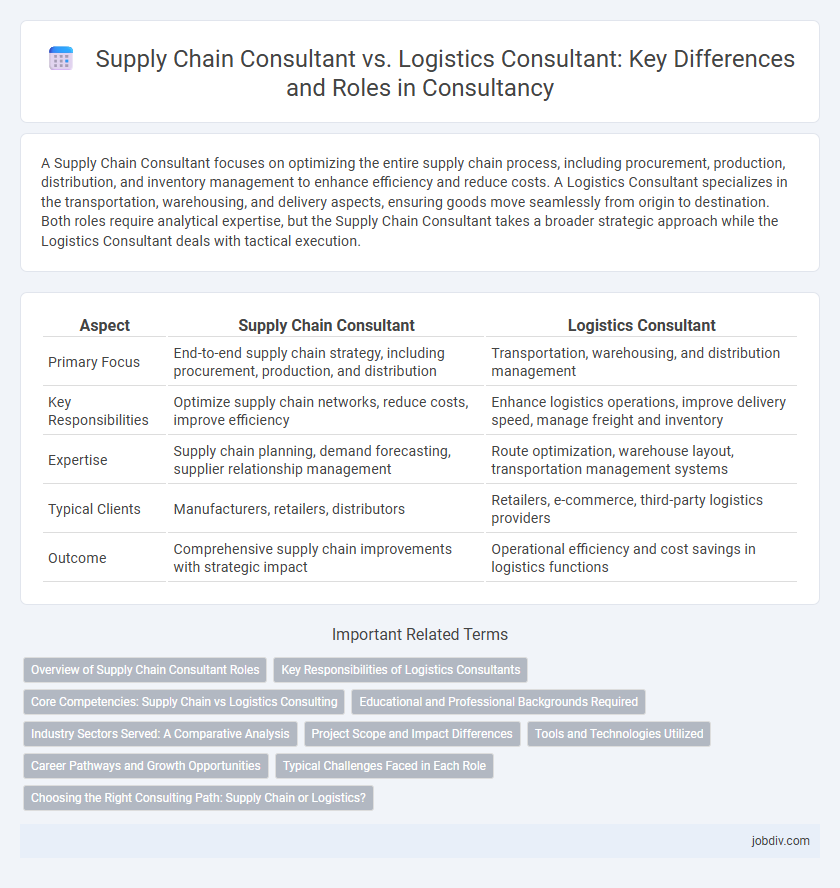A Supply Chain Consultant focuses on optimizing the entire supply chain process, including procurement, production, distribution, and inventory management to enhance efficiency and reduce costs. A Logistics Consultant specializes in the transportation, warehousing, and delivery aspects, ensuring goods move seamlessly from origin to destination. Both roles require analytical expertise, but the Supply Chain Consultant takes a broader strategic approach while the Logistics Consultant deals with tactical execution.
Table of Comparison
| Aspect | Supply Chain Consultant | Logistics Consultant |
|---|---|---|
| Primary Focus | End-to-end supply chain strategy, including procurement, production, and distribution | Transportation, warehousing, and distribution management |
| Key Responsibilities | Optimize supply chain networks, reduce costs, improve efficiency | Enhance logistics operations, improve delivery speed, manage freight and inventory |
| Expertise | Supply chain planning, demand forecasting, supplier relationship management | Route optimization, warehouse layout, transportation management systems |
| Typical Clients | Manufacturers, retailers, distributors | Retailers, e-commerce, third-party logistics providers |
| Outcome | Comprehensive supply chain improvements with strategic impact | Operational efficiency and cost savings in logistics functions |
Overview of Supply Chain Consultant Roles
A Supply Chain Consultant specializes in optimizing end-to-end supply chain processes, including procurement, production planning, inventory management, and distribution strategies to enhance overall efficiency and cost-effectiveness. Their role involves analyzing data, designing integrated supply chain solutions, and implementing technology to streamline operations across multiple departments. This contrasts with Logistics Consultants who primarily focus on transportation, warehousing, and the movement of goods within the supply chain network.
Key Responsibilities of Logistics Consultants
Logistics consultants specialize in optimizing transportation, warehousing, and inventory management to improve the efficiency of supply chain operations. They analyze shipping routes, implement cost-saving strategies, and leverage technology to enhance real-time tracking and distribution processes. Their key responsibilities include streamlining logistics workflows, reducing delivery times, and ensuring compliance with regulatory standards.
Core Competencies: Supply Chain vs Logistics Consulting
Supply Chain Consultants specialize in optimizing end-to-end processes including procurement, production, inventory management, and demand forecasting to enhance overall operational efficiency and reduce costs. Logistics Consultants focus on transportation, warehousing, distribution networks, and freight management to improve delivery speed, reduce shipping expenses, and ensure timely product flow. Both roles require strong analytical skills and expertise in supply chain software, but Supply Chain Consultants have a broader scope encompassing strategic planning, while Logistics Consultants emphasize execution and operational logistics.
Educational and Professional Backgrounds Required
Supply Chain Consultants typically require a strong foundation in operations management, industrial engineering, or business administration, often holding certifications such as APICS CPIM or CSCP to demonstrate expertise in end-to-end supply chain processes. Logistics Consultants generally emphasize knowledge in transportation management, warehousing, and distribution, with professional credentials like the Certified Logistics Professional (CLP) or Six Sigma Green Belt to optimize logistics performance. Both roles demand analytical skills and experience with ERP systems, but Supply Chain Consultants often pursue advanced degrees like an MBA to address strategic decision-making across multiple supply chain functions.
Industry Sectors Served: A Comparative Analysis
Supply Chain Consultants primarily serve manufacturing, retail, and healthcare industries by optimizing end-to-end supply chain processes, while Logistics Consultants focus on transportation, warehousing, and distribution sectors such as e-commerce, freight, and third-party logistics providers. Both roles overlap in sectors like automotive and consumer goods, yet Supply Chain Consultants emphasize strategic planning and integration across suppliers and customers, whereas Logistics Consultants concentrate on operational efficiency and cost reduction within distribution networks. This sector-specific expertise enables tailored solutions that meet the distinct demands of each industry's supply chain and logistics challenges.
Project Scope and Impact Differences
Supply chain consultants focus on end-to-end processes including procurement, production, and distribution strategies, optimizing the entire supply chain network to improve efficiency and reduce costs. Logistics consultants primarily specialize in transportation, warehousing, and inventory management, ensuring timely delivery and operational effectiveness within specific logistical functions. The project scope of supply chain consulting tends to be broader and more strategic, while logistics consulting projects are more tactical with immediate impact on operational execution.
Tools and Technologies Utilized
Supply Chain Consultants leverage advanced analytics platforms, cloud-based ERP systems, and AI-driven forecasting tools to optimize end-to-end supply chain visibility and strategic planning. Logistics Consultants focus on transportation management systems (TMS), warehouse management software (WMS), and real-time tracking technologies to enhance route optimization, inventory control, and last-mile delivery efficiency. Both roles increasingly incorporate IoT devices and blockchain for improved transparency and predictive maintenance across supply chain operations.
Career Pathways and Growth Opportunities
Supply Chain Consultants specialize in optimizing end-to-end processes including procurement, production, and distribution, offering broader career pathways into strategic roles such as supply chain director or operations manager. Logistics Consultants focus on transportation, warehousing, and inventory management, positioning themselves for growth in logistics management or specialized operational roles. Both career paths demand expertise in data analytics and technology integration, with opportunities expanding as global supply chains evolve and digitize.
Typical Challenges Faced in Each Role
Supply Chain Consultants often face challenges related to demand forecasting inaccuracies, inventory optimization, and aligning supplier performance with business goals. Logistics Consultants typically struggle with transportation inefficiencies, route optimization, and managing real-time shipment tracking to reduce delays and costs. Both roles require addressing data integration issues across complex systems to ensure seamless operational flow and improved responsiveness.
Choosing the Right Consulting Path: Supply Chain or Logistics?
Choosing the right consulting path between Supply Chain and Logistics hinges on your expertise and business needs; Supply Chain Consultants focus on end-to-end process optimization including procurement, production, and demand planning, while Logistics Consultants specialize in transportation, warehousing, and distribution efficiency. Companies seeking holistic improvements rely on Supply Chain Consultants to streamline operations across multiple functions, whereas those facing challenges in freight management or delivery networks benefit more from Logistics Consultants. Evaluating organizational priorities and specific pain points ensures alignment with the consultant's core competencies for maximum impact.
Supply Chain Consultant vs Logistics Consultant Infographic

 jobdiv.com
jobdiv.com